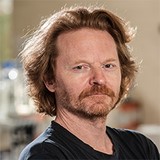Laureate 2020
Prof. Dr. Pierre Vanderhaeghen has been awarded the Generet Award for Rare Diseases for his research into the development of the human brain and ways in which things sometimes go wrong. This prestigious Prize, awarded by the Generet Fund which is managed by the King Baudouin Foundation, is linked to funding with a value of one million euros. The Prize was presented to Prof. Vanderhaeghen by HRH Princess Astrid.
The more we know about the way in which our brains develop, the better we will understand when and why things sometimes go wrong, and how certain rare diseases occur.
By awarding the Generet Award, the international jury of experts acknowledges the importance of the fundamental research carried out by neuroscientist Pierre Vanderhaeghen in this search. Pierre Vanderhaeghen is head of the Laboratory for Stem Cell and Developmental Neurobiology - VIB-KULeuven Centre for Brain and Disease Research and works at both KULeuven and ULB, where he was previously a full-time professor for many years.
“You can only fix what you understand”, says Prof. Pierre Vanderhaeghen, explaining his motivation. “There is still a lot we do not know about rare diseases, which can often cause severe disabilities. I want to help to solve the mystery. What drives me and the team of amazing researchers around me most of all is our curiosity about what is going on in our heads.”
Slow brain development in humans
In the past decade Prof. Vanderhaeghen and his team have been conducting comprehensive research into a way of monitoring the development of the human brain ‘in vivo’. “Our human brains are more complex than those of other animals. One major difference is that they develop very slowly: it takes about twenty years for them to become fully functional. The advantage of this is that a human being has plenty of time during which they can learn new things efficiently. This can hardly be researched using isolated cells in the laboratory; it is the complex interplay of cells in the head that determines how development takes place, and you need to be able to study that ‘in vivo’ in a whole organism.”
To do this, Prof. Vanderhaeghen and his team have found a solution. “One first important step was that we discovered how to make human stem cells develop into nerve cells, and then we transplanted those nerve cells into the brains of mice. We saw that these human brain cells preserved their own slow pace of development. They also became functionally integrated with the mouse brains. So they work with them, but without becoming mouse cells.”
Rare diseases due to errors in development
Many rare diseases are caused by genetic mutations that result in errors in brain development, which is expressed in (serious) learning disability, epilepsy, symptoms of autism and the like. “We suspect that in a lot of them the error is in the pace of development: they are developing either too slowly or too quickly”, Prof. Vanderhaeghen explains. Research has already begun into the rare conditions MECP2 duplication and RETT syndrome, which result in serious developmental problems, in collaboration with a spin-off that specialises in repositioning existing drugs for treatment of rare diseases. “With our animal model we are making new opportunities available for research at the cellular and molecular levels, which you cannot do with a CT scan.”
Science takes time
Prof. Vanderhaeghen explains: “Sharing ideas with clinical geneticists is very important for us. For example, they may notice that in two patients with completely different genetic mutations, there are still extensive similarities in the developmental disorder that affects them. That triggers research into whether there could be some very similar mechanisms involved, for example leading to nerve cells developing too rapidly in both cases.”
It is not possible to predict how long it will take before this results in new treatments. “Science takes time. We are very happy to have the resources provided by the Generet Fund, since they give us the time and freedom to try things out. In the next two to four years we will definitely be making a lot of discoveries about what happens in human nerve cells during their development. That first step is vital to allow us to make a difference later on for people with rare diseases.”
